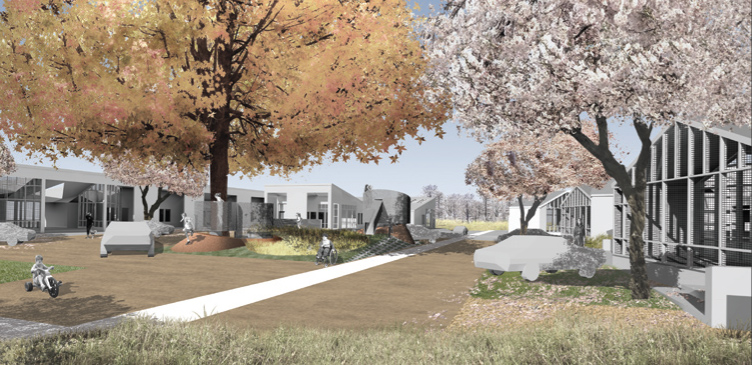
FAYETTEVILLE, Ark. — The University of Arkansas Community Design Center has developed a radical new vision of neighborhood for the Washington Co. chapter of Habitat for Humanity: no sidewalks, no curbs, no gutters and no flooding, even after torrential rain. Instead, residents will benefit from a “shared street” — on track to be the first of its kind in the United States — that promotes community, slows down cars and soaks up stormwater like a sponge.
“In this neighborhood, the street is the yard,” said Stephen Luoni, director of the Community Design Center. “By combining pedestrian and traffic systems in a space akin to a plaza, we permanently slow down the car and create great moments for chance social encounters.”
The project, which the design center developed in partnership with Professor Marty Matlock of the Ecological Engineering Group in the University of Arkansas Division of Agriculture, the university’s department of biological and agricultural engineering, the city of Fayetteville and McClelland Consulting Engineers, has won a 2008 ASLA Honor Award in Planning and Analysis from the American Society of Landscape Architects. A $23,000 grant by the University of Arkansas Women’s Giving Circle and a $464,000 grant by the Arkansas Natural Resources Commission that is funded by the Environmental Protection Agency have supported the design phase.
"The University of Arkansas is taking a leadership role with this low-impact development project,” said Bobby Hernandez, community planner for the Environmental Protection Agency’s Region 6, which includes Texas, Arkansas, Oklahoma, Louisiana and New Mexico. Hernandez also serves as technical adviser for Arkansas’ program to reduce water pollution from general sources, the “319 Nonpoint Source Pollution Program.”
“I don't know of any other project that we’ve funded in our region that comes close to what the university has done in demonstrating low-impact development’s role in decreasing stormwater runoff. This is a great example to other communities,” Hernandez said.
Located on Huntsville Road, adjacent to transitional housing for Seven Hills Homeless Center, the 10-acre parcel will include approximately 50 units, with one-third of the land left in conservation. A wet meadow, rainwater gardens, bioswales, and pervious parking and street surfaces will absorb and treat stormwater on site, a key goal in low-impact development. With no curbs, gutters and pipes needed, infrastructure costs are cut by half, Luoni said.
Architecture students Keith Wheeler and Russell Worley were charged with designing homes for the neighborhood. Challenged by Habitat’s request for low-cost, one-story homes with modest roof pitches and limited square footage, they focused on the porch.
“We tried to create a value that doesn’t exist in the standard Habitat house. Each house responds to its neighbor, the street and the park,” said Wheeler, a fourth-year student from Fayetteville, Ark. The students’ spacious screened porches, some with green walls, others with loggias or attached patios, extend housing square footage at one-quarter of the cost of conditioned space and lend variety to the streetscape.
“The porches are a really good amenity, for the street as much as for the houses,” Luoni said. “They amplify the social capital that’s lacking in the typical subdivision.” The development also avoids cookie-cutter banality by including several house types: an L-shaped house for corner lots, a shed-roofed house to harvest southern sunshine, and mews housing built along garden walkways. To reduce the development footprint, key to decreasing stormwater runoff, design center staff included duplex and triplex housing for one-third of the units and used small, 2,500-square-foot lots — about half the size of the typical suburban lot. Some of the homes have small front yards; many sit directly on the shared street.
“If you’re going to create a small lot development, you’ve got to reciprocate with great neighborhood features. That builds value for the house and leverages the investment the homeowners have made,” Luoni said.
Though dense development is a new model for Habitat for Humanity, Washington County director Patsy Brewer is happy to be ahead of the curve in developing sustainable housing.
“This pilot project is helping us to be better stewards of the land, which we have wanted to do for some time,” she said. “We hope that not only local developers, but other Habitat affiliates will use this as a model for green development.”
The Fayetteville project builds on the success of an earlier Habitat neighborhood in Rogers that won nine regional and national design awards. Infrastructure in the Rogers neighborhood is built and is performing well, Luoni said, though some flooding occurs in the wet meadow due to development at an adjacent site.
The U.S. Green Building Council has selected the Fayetteville Habitat neighborhood as a pilot project for LEED-Neighborhood Development certification. The Fayetteville project is one of 60 with priority for certification and special focus group study by the U.S. Green Building Council. Habitat for Humanity hopes to complete development plans for the neighborhood by the end of this year.